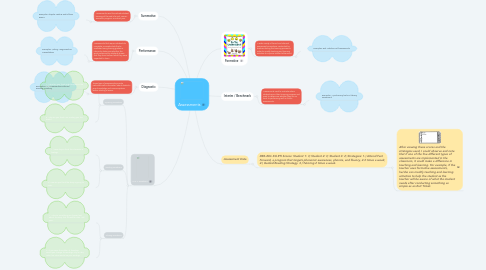
1. Summative
1.1. Assessments used to evaluate student learning at the end of a unit, course, semester, program, or school year.
1.1.1. Examples: Chapter Tests & End-of-term Exams
2. Performance
2.1. Assessments that require students to complete a complex task that is evaluated using scoring guides or rubrics to determine whether the work preformed by students shows that they have learned what they were expected to learn.
2.1.1. Examples: Writing Assignments & Presentations
3. Diagnostic
3.1. These type of assessments provide instructors with information about student's prior knowledge and misconceptions before starting a lesson.
3.1.1. Examples: Pre-assessments & Informal Reading Inventory
4. H.O.T. Questions
4.1. Opening Questions
4.1.1. 1.) What do you think might happen in the story?
4.1.2. 2.) Why do you think I am reading you this book?
4.2. Guiding Questions
4.2.1. 1.) How do you think the character is feeling?
4.2.2. 2.) How do you think the story is going to end?
4.3. Closing Questions
4.3.1. 1.) What is something you figured out about the story that the author didn't tell you?
4.3.2. 2.) If you were the author of this story, would you change the ending? Why or why not? If so, what would be your ending?
5. Formative
5.1. A wide variety of formal and informal assessment procedures conducted by teachers during the learning process in order to modify teaching and learning activities to improve student attainment.
5.1.1. Examples: Exit Tickets & Self-assessments
6. Interim / Benchmark
6.1. Assessments used to evaluate where students are in their learning progress and used to determine whether they are on track to performing well on future assessments.
6.1.1. Examples: A preliminary test & a literacy assessment
7. Assessment Data
7.1. DRA EDL KG RTI Scores: Student 1: 3; Student 2: 3; Student 3: 2; Strategies: 1.) Attend Fast Forward, a program that targets phonemic awareness, phonics, and fluency, 2-3 times a week; 2.) Guided Reading Strategy. 3.) Tutoring 2 times a week.
7.1.1. After viewing these scores and the strategies used, I could observe and note that if one of the five different types of assessments are implemented in the classroom, it could make a difference in teaching and learning. For example, if the teacher uses formative assessments, he/she can modify teaching and learning activities to help the student as the teacher will be aware of what the student needs after conducting something as simple as an Exit Ticket.

